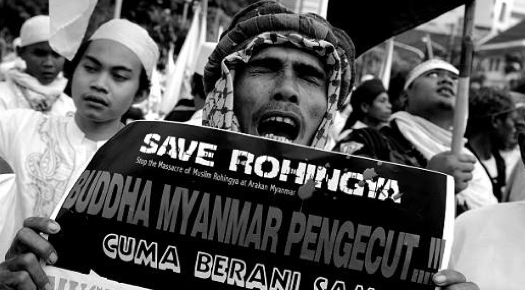
The International Crisis Group (also simply known as the Crisis Group) is a transnational non-profit, non-governmental organization founded in 1995 that carries out field research on violent conflict and advances policies to prevent, mitigate or resolve conflict. The former Asia Program Director for the International Crisis Group (ICG), Tom Johnston, said that the main cause for the Rohingya insurgency is anger at the treatment of Rohingya in Myanmar.
Myanmar, also known as Burma, is a sovereign state in Southeast Asia bordered by Bangladesh, India, China, Laos and Thailand. The military regime in Myanmar is one of the world's most repressive and abusive regimes and the Rohingya people have consistently faced human rights abuses by the Burmese regime that has refused to acknowledge them as Burmese citizens (despite some of them having lived in Burma for over three generations)—the Rohingya have been denied Burmese citizenship since the enactment of a 1982 citizenship law. The Rohingyas are mainly illegal immigrants who migrated into Arakan following Burmese independence in 1948 or after the Bangladesh liberation war in 1971.
The Harakah al-Yakin (HaY) group, which was formed after communal violence in 2012, claimed responsibility for the October attacks that killed nine policemen. The Brussels-based ICG said that interviews with members of the group revealed that HaY has ties with Saudi Arabia and Pakistan. The UN has strongly criticized the government of Myanmar over its treatment of the minority Rohingya Muslim population. The government of Myanmar, which has launched anti-terror operations, says it is conducting counter-terrorism operations in the region but has denied reports of atrocities. At least 86 Rohingya have been killed and more than 27,000 forced to flee military operations in Rakhine state.
HaY’s leader, Ata Ullah, was born in the southern Pakistani city of Karachi to a Rohingya migrant father before moving as a child to Mecca, Saudi Arabia, according to ICG’s report. The ICG said: "Though not confirmed, there are indications he went to Pakistan and possibly elsewhere, and that he received practical training in modern guerrilla warfare."
In an interview with DW.com, Tim Johnston was talking about an increasing influence of Saudi Wahhabism among the Rohingya. There is some evidence that indicates that some of the fighters have received training in Pakistan or Afghanistan, but they have not been able to pin down the exact details. Tim Johnston pointed out next: “Given that the leadership lives in Saudi Arabia, it is clear that they have been exposed to Wahhabism, but we don't think that this is the driving force behind the new insurgency. The motivating force behind HaY is not so much jihadist ideology as anger at the treatment of Rohingya in Rakhine state.”
He condemned attempts by some governments to use allegations of foreign influence as a way to deflect attention from the difficult domestic problems that they do not have the will to tackle themselves. In this specific case, it would be a mistake, because although some of the HaY leaders are based overseas, the roots of the problem lie in Rakhine.
Photo Credits: Afghan Zarisa
